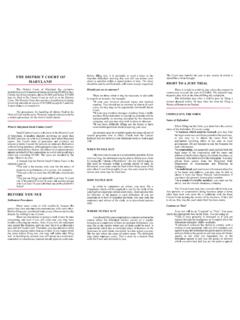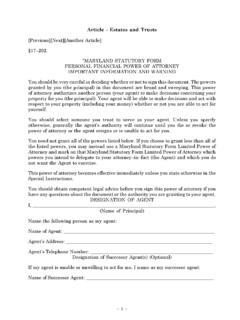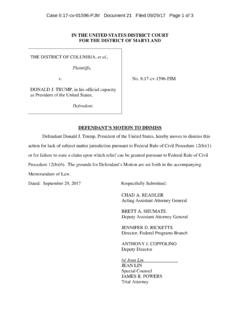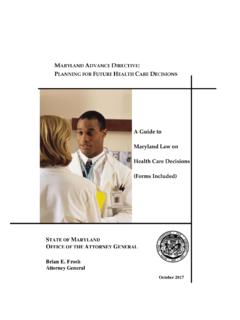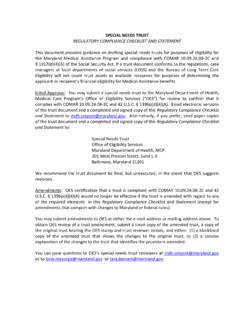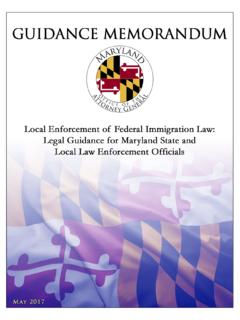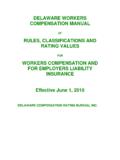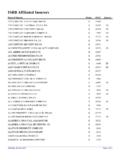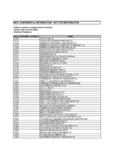Transcription of MARYLAND LAWS AND REGULATIONS ON …
1 1 MARYLAND laws AND REGULATIONS ON insurance PREMIUM laws : 27-601. (a) In this subtitle the following words have the meanings indicated. (b) (1) Commercial insurance means property insurance or casualty insurance issued to an individual, a sole proprietor, partnership, corporation, limited liability company, or similar entity and intended to insure against loss arising from the business pursuits of the insured entity. (2) Commercial insurance does not include: (i) policies issued by the MARYLAND Automobile insurance Fund; (ii) policies issued by the Joint insurance Association; (iii) workers compensation insurance ; or (iv) title insurance . (c) (1) Personal insurance means property insurance or casualty insurance issued to an individual, trust, estate, or similar entity that is intended to insure against loss arising principally from the personal, noncommercial activities of the insured.
2 (2) Personal insurance does not include: (i) motor vehicle liability insurance policies subject to 27-613 of this subtitle; (ii) policies issued by the MARYLAND Automobile insurance Fund; (iii) policies issued by the Joint insurance Association; or (iv) surety insurance . 27 (a) For purposes of this subtitle, with respect to policies of personal insurance , private passenger motor vehicle liability insurance , commercial insurance , and workers compensation insurance , the issuance by an insurer of a new policy to replace an expiring policy issued by that insurer is a renewal. 2 (b) For purposes of this subtitle, with respect to policies of personal insurance , private passenger motor vehicle liability insurance , commercial insurance , and workers compensation insurance , the issuance by an insurer of a new policy to replace an expiring policy issued by another admitted insurer within the same insurance holding company system, as defined in 7 101 of this article, is a renewal if: (1) the policyholder s premium does not increase; and (2) the policyholder does not experience a reduction in coverage.
3 27 610. (a) (1) This section applies only to policies of personal insurance and private passenger motor vehicle liability insurance policies subject to 27 613 of this subtitle. (2) Unless an insurer has provided notice of its intention not to renew a policy in compliance with this subtitle, the insurer must provide each policyholder with notice of renewal premium due at least 45 days before the due date. (3) If a policyholder is being transferred between admitted insurers within the same insurance holding company system, as defined in 7 101 of this article, the notice required under paragraph (2) of this subsection shall include disclosure of the transfer. (4) A licensed insurance producer may provide notice under paragraph (2) of this subsection on behalf of the insurer.
4 (5) The duty to provide notice under paragraph (2) of this subsection is deemed discharged if: (i) the insurer shows that its established procedures would have resulted in placing the notice of renewal premium due in the United States mail; and (ii) there is no showing that in fact the notice was not placed in the mail. (b) If an insurer fails to provide notice of renewal premium due under subsection (a) of this section, and subsequently the policyholder fails to make timely payment of the renewal premium, the insurer must: (1) provide coverage for each claim that: (i) would have been covered under the policy; and (ii) arises within 45 days after the date the insured discovers or should have discovered that the policy was not renewed; and (2) renew the policy on tender of payment within 30 days after the policyholder discovers or should have discovered that the policy was not renewed.
5 27 612. (a) (1) If an insurer fails to comply with any provision of 27-602, 27-603, 27-604, 27-605, 27-606, 27-607, 27- 608, 27-610, or 27-613 of this subtitle, the insurer is liable to the applicant for the coverage that was requested, or that would have become effective except for the failure to comply with these provisions, unless the person seeking coverage: 3 (i) no longer wishes the coverage; (ii) has obtained other substantially equivalent coverage; or (iii) fails to tender or pay the premium after reasonable demand for the premium has been made. (2) The liability of an insurer under paragraph (1) of this subsection is in addition to any other penalties applicable by law. (b) Liability for coverage does not apply to failure to comply with 27-611 of this subtitle, as it relates to motor vehicle liability insurance .
6 27 212. (a) This section does not apply to life insurance , health insurance , and annuities. (b) Except to the extent provided for in an applicable filing with the Commissioner as provided by law, an insurer, employee or representative of an insurer or insurance producer may not pay, allow, give, or offer to pay, allow, or give directly or indirectly as an inducement to insurance or after insurance has become effective: (1) a rebate, discount, abatement, credit, or reduction of the premium stated in the policy; (2) a special favor or advantage in the dividends or other benefits to accrue on the policy; or (3) any valuable consideration or other inducement not specified in the policy. (c) An insured named in a policy or an employee of the insured may not knowingly receive or accept directly or indirectly a rebate, discount, abatement, credit, reduction of premium, special favor, advantage, valuable consideration, or inducement described in subsection (b) of this section.
7 (d) Except as otherwise provided by law, a person may not knowingly offer, promise, or give any valuable consideration not specified in the policy, except for educational materials, promotional materials, or articles of merchandise that cost no more than $25, regardless of whether a policy is purchased. (e) (1) An insurer may not make or allow unfair discrimination between insureds or properties having like insuring or risk characteristics in: (i) the premium or rates charged for insurance ; (ii) the dividends or other benefits payable on the insurance ; or (iii) any of the other terms or conditions of the insurance . (2) Notwithstanding any other provision of this section, an insurer may not make or allow a differential in ratings, premium payments, or dividends for a reason based on the sex, physical handicap, or disability of an applicant or policyholder unless there is actuarial justification for the differential.
8 4 (f) This section does not prohibit an insurer from: (1) paying commissions or other compensation to licensed insurance producers; or (2) allowing or returning to its participating policyholders, members, or subscribers lawful dividends, savings, or unabsorbed premium deposits. 27 216. (a) A person may not willfully collect a premium or charge for insurance if the insurance is not then provided, or is not in due course to be provided subject to acceptance of the risk by the insurer, in a policy issued by an insurer as authorized by this article. (b) (1) A person may not willfully collect a premium or charge for insurance that: (i) exceeds or is less than the premium or charge applicable to that insurance under the applicable classifications and rates as filed with and approved by the Commissioner; or (ii) if classifications, premiums, or rates are not required by this article to be filed with and approved by the Commissioner, exceeds or is less than the premium or charge specified in the policy and set by the insurer.
9 (2) Paragraph (1) of this subsection does not prohibit: (i) a surplus lines broker that holds a certificate of qualification under Title 3, Subtitle 3 of this article from charging and collecting applicable State and federal taxes in addition to the required premium; (ii) a life insurer from charging and collecting the amount actually expended for a medical examination of an applicant for life insurance or reinstatement of a policy of life insurance ; (iii) an insurance producer from charging a fee, not exceeding 15% of the premium, for services rendered in replacing insurance in an insurer if commissions are not payable by the insurer; or (iv) a fund producer from charging and collecting, as actual expenses incurred in placing automobile insurance with the MARYLAND Automobile insurance Fund: 1.
10 A maximum charge of $10 plus $1 more than the actual charge by the Motor Vehicle Administration for a driving record required to be presented with the application, unless otherwise provided by the Fund; or 2. the amount provided in subsection (e) of this section. (3) (i) Subject to subparagraphs (ii), (iii), (iv), and (v) of this paragraph, paragraph (1) of this subsection does not prohibit an authorized insurer from charging and collecting, if approved by the Commissioner, reasonable installment fees or reasonable fees for late payment of premiums by policyholders or both. (ii) The Commissioner: 1. shall review administrative expenses submitted by an authorized insurer that are associated with late payments or installment payments; and 2. may approve a late fee or installment fee not to exceed $10.
